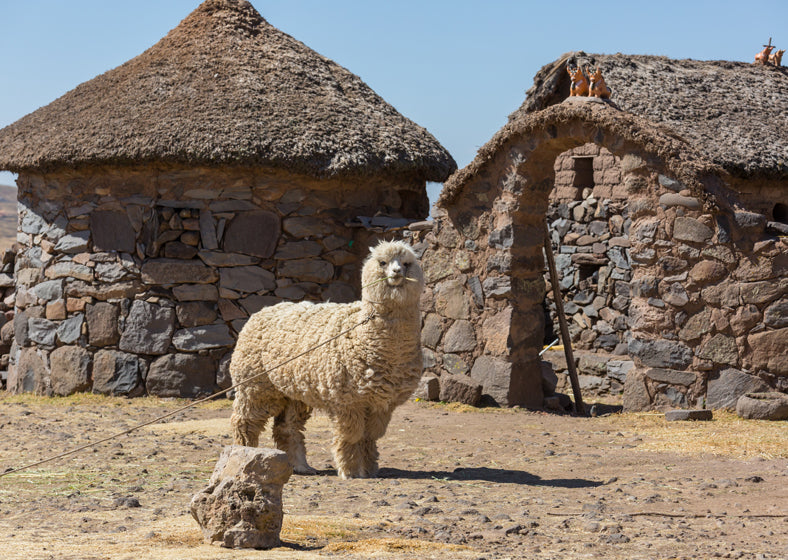Alpaca vs Merino Wool - Which One is the Best?
When you think of wool, you think of the kind of wool that comes from sheep. But, did you know that camels, rabbits, goats, alpacas, and llamas all give their fur to produce wool fabrics? While some are more expensive than others, they make up for the extra costs in warmth, softness, and many other essential factors. Alpaca and merino are two such types of wool that offer extreme comfort. But, among them, which one is the best for you?

What is Alpaca wool fabric?
Alpaca wool is one of the most luxurious wool types derived from the fibers that naturally grow on alpaca, a domesticated member of the camel family. It is an extremely lightweight, soft, and durable material that comes in 22 colors. Alpacas are usually shorn during the spring season. Due to this, they have shorter hair during the warmer months, and therefore, the fleece can be spun, dyed, woven, or felted.

There are two different types of Alpaca breeds: Huacaya Alpaca and Suri Alpaca.
Huacaya fiber is dense, soft, spongy, and has natural crimps. This is what makes it a naturally elastic yarn well-suited for knitting. On the other hand, Suri alpacas do not have any crimp and therefore are a better fit for weaving. They have long, fine, and silky hair that looks like dreadlocks.
The average annual staple length of Suri fiber is around 4 to 6 inches, whereas it is 3 to 5 inches for Huacaya. Both of them have different scale structures. While the Huacaya has a balanced ortho- and para-cortical structure, which makes its fiber curl, Suri contains many para-cortical cells, which keep its fiber straight.
What is Merino wool?

A natural fiber derived from the merino sheep, merino wool is much softer and finer than regular wool. This material is prized for its moisture-wicking, odor-resistant, and breathable nature. When compared to traditional wool, the products made of merino don't aggravate the skin.
Alpaca vs Merino
Even though Alpaca and Merino are natural, sustainable, and luxurious wool products that can keep you warm and comfy, they have so many differences.
Warmth
Alpaca fibers are entirely hollow whereas merino sheep’s wool contains pockets of air. Therefore, when it comes to warmth, alpacas rank first. Yeah, both fibers indeed allow air to spread out the surface so that it gets trapped inside. But, the extra hollow voids present in the alpaca wool offer much greater thermal properties as well as more air to fill. It also makes alpaca fibers extremely lightweight and provides greater warmth for the weight than you will ever get with merino wool.
Strength
Alpaca fibers have higher tensile strength when compared to merino. This means they are capable enough to stand against more pressure or tension before breaking. Research studies show that alpaca fibers have a tensile strength of about 50 N/ktex while merino wool has only 30-40 N/ktex.
Softness
Did you know that alpaca wool feels closer to the silkiness of cashmere? When compared to merino wool, they have a higher degree of softness and a uniform surface. They are also free of lanolin, a wax found in sheep’s wool that can cause allergic reactions.

But, how is the degree of softness in wool measured? The lower the micron measurement, the finer and softer it is. Alpacas micron count ranges from 18 to 21 microns, whereas merino wool’s micron count ranges from 20 to 25.
Breathability
When it comes to breathability, both alpaca wool and merino wool wick away moisture from your skin and transport it to the wool product's exterior. Hurray, it’s a tie!
Hypo-allergenic
Some people say that they can’t use wool products as they are allergic to the natural wax, lanolin, found in wool. Alpaca is naturally free of lanolin and therefore has a hypo-allergenic advantage over merino wool which contains lanolin.
Water-resistant
Alpaca wool keeps water off the skin and therefore can be considered water repellent. This is because alpaca only absorbs around 10-11% +/- of their weight in water, whereas merino wool absorbs about 30%. That means when wet, products made of alpaca dry faster and insulate better than merino.
Alpaca wool sure does beat merino in every category! It is warmer, stronger, softer, breathable, hypo-allergenic, water repellent, and has excellent moisture-wicking properties. Yeah, alpaca wool is comparatively more expensive than merino wool, but if you wish to go for the inexpensive one, merino seems to be the best!
If you can afford alpaca, then perfect! Don’t think twice, just go for it. Grab an alpaca product - be it pillows, blankets, toppers, or garments and test it yourself. Well, who doesn't like the soft and comfy alpaca next to their skin?